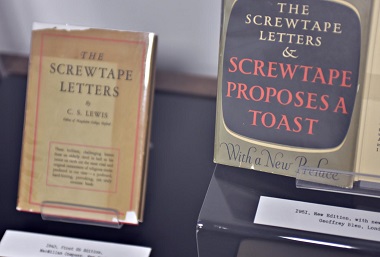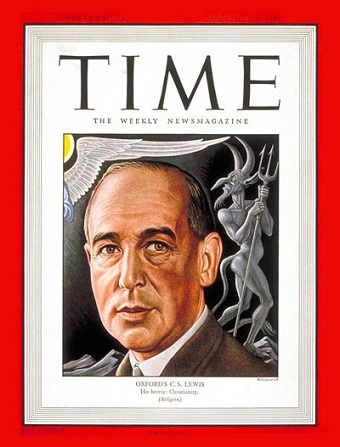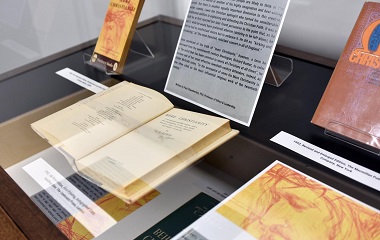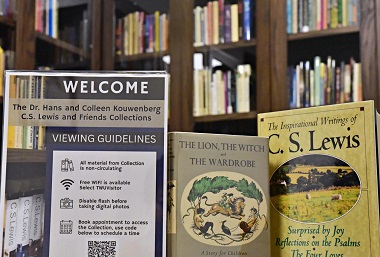
C.S. Lewis was a man of many talents, not least as a creative apologist.
A new exhibit at Trinity Western University’s Kouwenberg C.S. Lewis and Friends Collection is showcasing Mere Christianity, C.S. Lewis’ classic work on Christian apologetics.
Paul Chamberlain wrote this feature essay for the exhibit.
Mention C.S. Lewis’ name and most people are likely to think of The Chronicles of Narnia or another of his highly imaginative and best-selling novels.
But there is another equally important dimension to this creative writer, namely, Lewis the Christian apologist who turned his considerable intellectual abilities to explaining and defending the Christian faith.
It was a faith he at first rejected but later found persuasive – to the point that, as he put it, while he would have preferred atheism (desiring to be left alone), he felt he had no intellectual choice but to embrace it. He did so, “kicking and screaming,” as “the most dejected, reluctant convert in all of England.”1

‘The Apologetics of C.S. Lewis’ exhibit showcases his classic work, Mere Christianity. TWU photo
Once convinced of the truth of “mere Christianity,” however, a term he borrowed from the 17th century theologian, Richard Baxter, to refer to “the belief that has been common to nearly all Christians at all times,”2 he became one of her most effective 20th century defenders.
Indeed, as Alister McGrath notes, “to the annoyance of some, his Mere Christianity is now often cited as the most influential religious work of the 20th century.”3
Apologist as translator
As an apologist and teacher, Lewis saw himself primarily as a translator of Christian teaching into the vernacular and not only jettisoned all technical theological terms from his own writings and speeches but called upon other Christian teachers to do the same.
Indeed, he recommended that every ordination exam for ministers include the requirement to translate a theological passage into common language using no technical terms.4 To this end, Lewis’ apologetics writings were also replete with analogies to make theological ideas easier both to grasp and to digest.
Not a simple religion

The Kouwenberg collection houses 900 books, journals, and audio-visual materials. TWU photo
In contrast to the way apologetics is sometimes done today, Lewis employed an astonishingly low-pressure approach.
He simply set out mere Christianity which, as he put it, “is what it is and was what it was long before I was born and whether I like it or not,” and invited his audiences to make their own choices concerning it.
I’ve made mine, now you must make yours, he intimated. If, however, people chose to reject Christianity, he warned, they should be sure they were not rejecting one of the skewed or “simple” versions of it which he called “boys’ philosophies.”5 If Christianity was something we were making up, he said, we could make it simpler or easier, but it is not.6
Lewis pressed this point further. Not only was Christianity not simple, but once properly understood, it was also “not neat, not obvious, not what you expect,”7 and, surprisingly, this became a key reason he believed it.
“It is a religion you could not have guessed,” he said. “If it offered us [teaching] we had always expected, I should feel we were making it up.”8
Thus, when explaining the difficult doctrine of the Trinity, he observed that it was not a concept humans would have invented. When people make up things like religions, he said, they are far simpler and easier to grasp. The very unexpected nature of the Trinity became a reason to believe it.
The trilemma

C.S. Lewis made Christianity accessible to the broad public.
Lewis the apologist is perhaps best known for his trilemma often encapsulated as Jesus: liar, lunatic or Lord. It was a device he employed in many forms throughout his lifetime when calling on his audiences to consider what he took to be the most important question of all, ‘What are we to make of Jesus Christ?’9
The trilemma was his way of drawing attention to Jesus’ stupendous claims concerning himself and heading off what he believed to be the most foolish, yet common, answer to this question, namely that Jesus was a great moral teacher but not the divine Son of God. That option is simply not available to us, he said, and he used the trilemma to explain why.10
Perhaps the most common way of rejecting the force of the trilemma in our day, as in his, is to claim that Jesus never made the astounding claims attributed to him but, rather, his later followers exaggerated his claims and over time the legend developed that he had.
Lewis noted that this amounted to labeling these parts of the gospels as legends and, as a literary historian who had read a great deal of legend himself, he believed it was clear that the gospels were not the same sort of thing. They were not artistic enough and, from an imaginative point of view, were clumsy. They read like historical narratives and should be interpreted as such.
Indeed, he criticized certain theologians who interpreted key claims of Jesus as legendary precisely for not having read enough legend to be able to tell the difference or to recognize legend when they saw it. They lacked a standard of comparison.11
Latent Christianity
Perhaps we may wonder if Lewis ever recommended a way of doing apologetics to others. On one occasion, when speaking to a room full of ministers and youth workers about apologetics, he did so and the approach he recommended was probably as surprising to them as it might be to many of us.
Rather than needing “more little books about Christianity,” he told the ministers, we need “more little books by Christians on other subjects – with their Christianity latent.”12
He observed that books which explicitly defend materialism do not make a person a materialist. Rather, it is the materialist assumptions in other books which do that. He encouraged Christians to write the best introductory books on science with their Christianity latent rather than explicit, and their science honest.13
Surprising answers

From the current exhibit. TWU photo
We would be remiss if we did not comment on how surprising some of Lewis’ answers must have been when explaining certain teachings of Christian faith.
A factory worker in 1944 asked him which of the world’s religions gives the greatest happiness. Lewis responded that the worship of oneself was the best for that and told of an older gentleman he knew who had lived a life of total self-service and self-worship.
Regrettably, said Lewis, this man was one of the happiest people he knew. He then added that if you were looking for a religion to make you happy or comfortable, he would not recommend Christianity. A bottle of Port would do that.14
To be clear, Lewis taught elsewhere that Christianity did promise happiness but it is a far different kind from what most people think of today and comes only through a relationship with our Creator in which we surrender our entire beings to him.15
Often people who study apologetics are told they should read recent books over old ones so as to address current issues, not old ones. Lewis’ writings are the exception to this rule.

The Kouwenberg C.S. Lewis and Friends Collection opened at TWU last fall. TWU photo
Not only did he encourage his own audiences to read old books (by which he meant hundreds of years old), but his own works, now over two generations old, continue to be relevant for our day and anyone serious about apologetics would be remiss not to read them . . . and then read them again.
- C. S. Lewis, Surprised by Joy: The Shape of My Early Life (New York: Free Press, 1970), p. 228-229.
- C. S. Lewis, Mere Christianity (New York: Macmillan pub., 1952), p.6.
- Alister McGrath, C.S. Lewis: A Life (Carol House, IL: Tyndale House pub., 2013), p. xi.
- Lewis, “Christian Apologetics”, in God in the Dock, ed. Walter Hooper (Grand Rapids: Eerdmans pub., 1970), 98-99. See also “God in the Dock” in the collection of readings with the same title, God in the Dock, p. 243.
- Lewis, Mere, p. 46
- Ibid., p. 145.
- Ibid., p. 46-47.
- Ibid., p. 47.
- Lewis, “What Are We To Make of Jesus Christ?” in God in the Dock, 156-160.
- Ibid., 158. See also Lewis, Mere, p. 55-56.
- Ibid., p. 159-160. See also C.S. Lewis (ed.), Christian Reflections, London: Fount Paperbacks, 1988, pp. 193, 197.
- C.S. Lewis, “Christian Apologetics” p. 93.
- Ibid., 93.
- Lewis, “Answers to Questions on Christianity” in God in the Dock, 58.
- Lewis, C.S. “The Weight of Glory.” The Weight of Glory and Other Addresses. Ed. W. Hooper. New York: Simon and Schuster, 1996, p. 25-26.

Paul Chamberlain is director of the Institute for Christian Apologetics at TWU.
Paul Chamberlain, PhD, is Professor of Ethics & Leadership and Director of the Institute for Christian Apologetics. He has authored five books including Can We Be Good Without God (1996), Why People Stop Believing (2011) and Everyday Apologetics (2020, co-edited), and published numerous articles in the fields of apologetics, ethics and philosophy of religion.
This comment is re-posted by permission.
‘The Apologetics of C.S. Lewis’ exhibit will run until the end of summer and can be viewed online or in-person at TWU’s Alloway Library.
Go here for an article about the October 2022 opening of the Kouwenberg C.S. Lewis and Friends Collection, which features rare and autographed copies of books by C.S. Lewis and Inklings authors.

Chamberlain: “Lewis the apologist is perhaps best known for his trilemma often encapsulated as Jesus: liar, lunatic or Lord.”
These days, some atheists I know will quickly divert to Jesus as myth or Jesus as legend.
So I ask at the outset:
In your view, who was Jesus (aka Yeshua) of Nazareth? I think there are five possibilities:
1. Myth: (never existed)
2. Legend: existed; but stories about a first-century man became embellished with retellings over the years, turning him into the God-man of the New Testament
3. Liar: a first-century man who was sane, but lied to others about being God’s son.
4. Lunatic: a first-century man who was deluded/insane; he really thought he was God’s son.
5. the Lord: a first-century man but also God incarnate (1 Timothy 3:16)
From the online article: ‘Difference Between Legend and Myth’:
1. A legend is a traditional or historical story about people, places and events of ancient times while a myth is also a traditional story of how certain customs came into being.
2. A myth is closely linked to religion while a legend is not.
3. A legend is a story of real people with super powers while a myth is a story of gods and divine beings.
4. Both intend to teach a lesson with people relating more with legends than with myths.
5. The word ‘legend’ comes from the Old French word ‘legende’ while the word ‘myth’ comes from the Greek word ‘mythos.’
Also, read: ‘Michael D. Aeschliman on C.S. Lewis and Scientism’ by Peter Biles (March 28/23) on the ‘Evolution News & Science Today’ website.